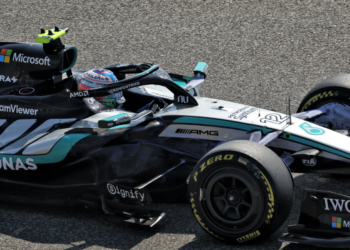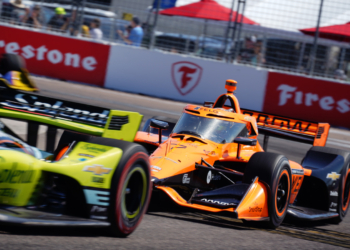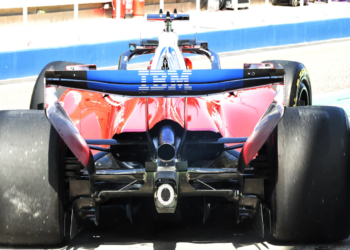My Ryanair flight home from the Spanish GP on Sunday night was mostly spent pouring over various race lap analysis, speed trap data and sector times, amongst other things… that’s right, it’s a rock and roll lifestyle on the road these days. A few things caught my eye, some I’m still trying to analyse further and make sense of, but one set of figures that stood out for me, was the summary of pitstop times from the race.
The times show patterns forming, many of which you won’t be too surprised at, but there are a few details that surprised me just a little. I’ll refer to all times as the total time spent in the pit lane, because that’s how it should be. It’s important to remember that the driver is as much a part of the team as the guys and girls waiting for him in the box and therefore his entry and exit’s are just as crucial as the speed with which the wheels are all replaced etc.
Red Bull Racing were consistently the fastest team in Spain, as they have been for some time now. They do a lot of work in this area and have some fairly clever technology, combined with their own well choreographed procedures and preparation, to help produce the ultimate stops.
To give one little insight into the levels of detail that teams at this end of the grid go into, Red Bull use a laser positioning system, mounted on the overhead gantry, that shows the gun men exactly the height to hold the guns at, before the car arrives in the box. Assuming the driver hits his marks, something they practice lots too, it takes another variable out of the equation, importantly improving consistency.

Sebastian Vettel had the fastest stop of the day at 21.599 seconds, which equates to a lightening quick 2.1s stationary. That’s fast and crucially they’re able to do it consistently at this level and of course it gives them a clear advantage in a race situation. Ferrari were next quickest with Alonso’s car at his final stop, with a 21.664s and McLaren third with Magnussen at 21.768s.
They’re all very close times, almost unnoticeably different to the naked eye in the heat of battle, but the bigger picture comes when you look at the average times of all stops of each team.
Red Bull’s average pitstop time in the Spanish GP, taken over the 5 stops the team completed, was just 21.796s, now that’s impressive. The crew, including both drivers, are doing an incredible job here, because I can assure you from my own experience, it’s not a straightforward task. You could argue that, as current world champions, they have a very small advantage from their ‘garage one’ position in the pit lane, in that the drivers can approach the box in a straight line, rather than swinging in at the last minute. This may be true, however small the actual time benefit is, but I’ve no doubt they’d rightly argue it was their superior performances of the past few years that have afforded them this extra luxury in the first place.
If we take the other extreme and look at the slowest pitstops from Barcelona, it’s not Caterham, or Marussia, but in fact Sauber, that under performed dramatically in this area. The team’s fastest pitstop of the day, Gutierrez’s third, was timed at 23.025s, almost 1.5s slower than that of Red Bull’s best with Vettel.
Over the course of the entire grand prix, where both drivers completed three stops, it meant that Sauber’s cars spent a full 5.687s longer in pit lane than the world champions. The team’s average pit-stop time, over their five visits, was a disappointing 24.452s.
The time spent in pit lane bears no correlation to the speed of a team’s car, the fact the RB10 lapped the Circuit de Catalunya 1.5s/lap faster than the C33 is irrelevant in this instance. For each stop they both travel the same length of pit lane at exactly the same limited speed and both change all four wheels and tyres each time. The differentiator then, has to be the technology used to change those wheels and the human element of each team’s operation.
Finance clearly plays a big part in the technology side of things, so I’m certainly not criticising Sauber, or anyone else, but it’s interesting to highlight the amount of resource that big teams utilise in this crucial area. It’s easy to see that if you can lose five and a half seconds in a race just in the pit lane, without having any abnormal pit-stop issues, that to be competing at the front you need to treat all aspects of the pit-stop as seriously as you treat the car itself.
At the front end of the grid, teams do have some pretty clever and incredibly well engineered equipment. Crews are being trained extensively in their roles, using video and data analysis. They’re being physically coached, tailoring exercises and routines specifically for individual roles and even recently we’ve seen teams utilising sports physiologists to try and gain any edge they can over rivals. It’s a development race all of it’s own, but if you’re going to spend millions shaving tenths of a second per lap from your car’s pace, you clearly can’t afford to lose a second in pit lane each time you stop.
As an aside, you might note there’s been no mention of the one team dominating our sport in such intimidating style right now, Mercedes? Their fastest pitstop on Sunday was well over half a second slower than that of the chasing Red Bulls, at 22.254s on Rosberg’s first stop. The team’s average pitstop time from both cars over the whole race, was 22.776s, a full second slower than RBR’s equivalent.
There could be a number of reasons for this, but the team have not yet excelled in this area historically, despite having had some fairly advanced technology amongst their pitstop equipment.
There is an argument to say that with their current on-track advantage, they don’t need to risk this year’s, extra stringent, unsafe pit-stop release punishments and it would be possible to dial in a small safety cushion with the traffic light control software, but looking at the stops myself, they just didn’t look as smooth as they could be. There was also some talk in earlier races that the team’s sophisticated front jacks had been downgraded to minimise risk, whilst they enjoy their current situation.
Whatever the reason the championship leaders’ were only able to rank fourth in the table of fastest stops in Spain, they have more than enough pace in hand to cope right now.
There will however come a time, sooner or later, that Nico Rosberg or his team, can no longer afford to lose the 7.5 tenths of a second longer he spent in the pit lane over the race, than closest chasing rival, Daniel Ricciardo did.
Red Bull are coming, they need a big helping hand from Renault in a hurry, but if and when they get it, everything else seems to be already in place and they’re ready to pounce.
Some key figures from the article:
Fastest stops:
Vettel – 21.599s
Alonso – 21.664s
Magnussen – 21.768s
Rosberg – 22.254s
Team average stop times:
Red Bull – 21.796s
Mercedes – 22.776s
Sauber – 24.452s






Discussion about this post